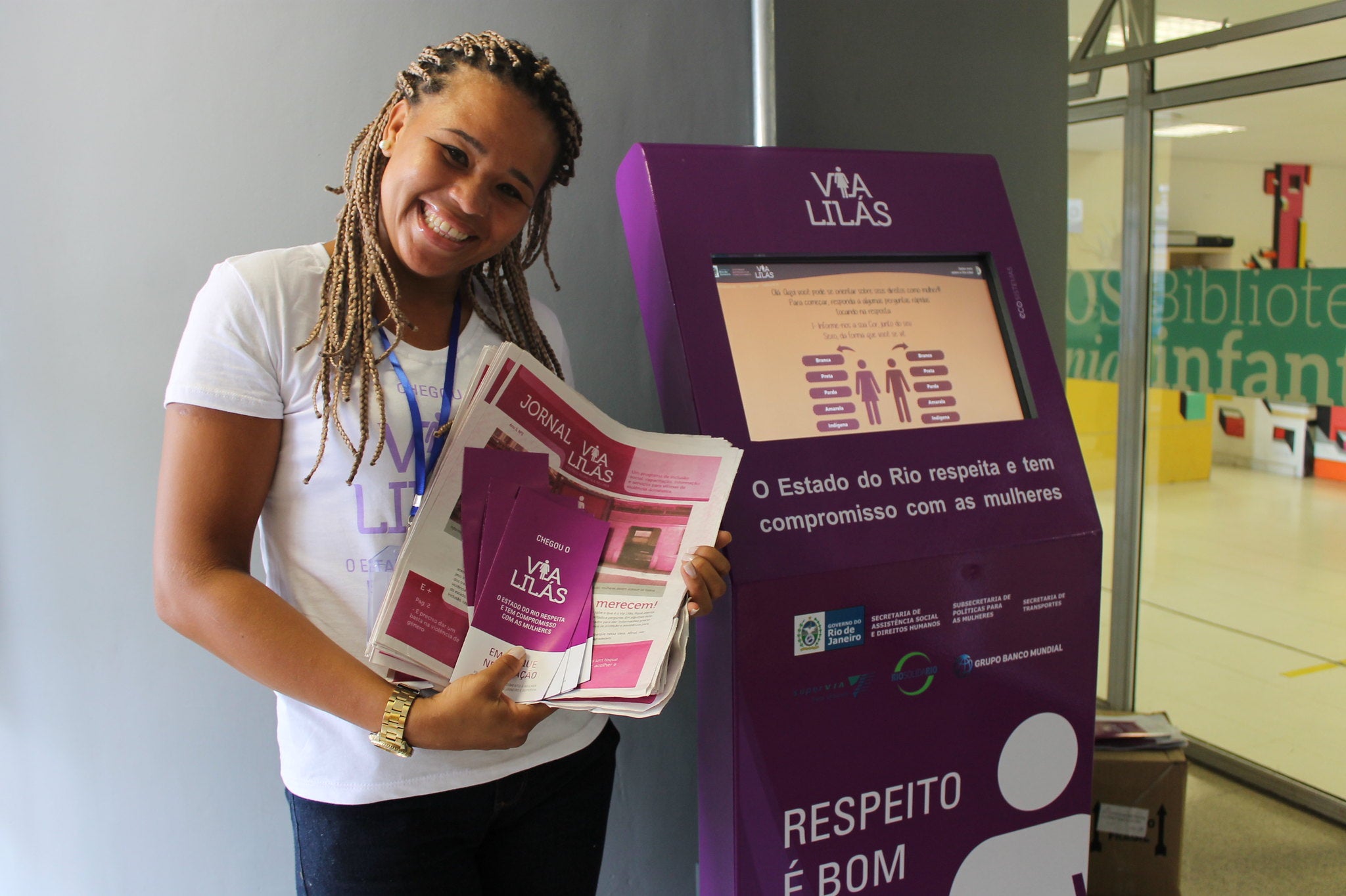 Pro-women campaign in Brazil. Mariana Kaipper Ceratti/World Bank
Pro-women campaign in Brazil. Mariana Kaipper Ceratti/World Bank
First, a clarification: I am a man, for which reason none of my opinions with respect to violence against women can even begin to address the suffering and humiliation of a victim of that abuse, in any of its many forms. But what I do know, as the father of two girls, Maite and Lía, is that the feminicides, abuses, beatings, injustices and fear need to stop. For many, being a woman means living in fear, in uncertainty. This has to end.
Sadly, Latin America and the Caribbean has some of the worst gender violence indicators of any region. The statistics are truly shameful. Thousands of women (3,529, according to an ECLAC survey) were murdered in Latin America in 2018. One in three women in the region is the victim of some form of abuse – physical, psychological or sexual. And one if four was married or in an intimate partnership before the age of 18, according to UNICEF. That is also a form of violence.
How can will live with this reality and not do anything about it?
While people are now more aware that this situation is unacceptable, it is not enough. That awareness should extend to the farthest corners of our societies. We should own it and make everyone more aware – and not just when the calendar shows that it is March 8 and we rush to celebrate International Women’s Day– but every day. We should not deceive ourselves; what is at stake here are lives, futures and hopes. The slogan is shouted in the streets: “Ni una menos” (“Not one less woman”). For all of us, reiterating that demand should be a moral imperative until it is no longer necessary.
Better response, more prevention
We are faced with a daunting challenge at both the individual and collective levels. It demands simultaneous, sustained actions on multiple fronts, as well as learning from others’ successful experiences.
Some Latin American governments, for example, are undertaking important efforts to strengthen their regulatory, legal and institutional frameworks to improve the response to and prevention of violence against women . The World Bank supports these initiatives, and it is crucial to do so, even knowing that we must do much more.
In Peru, for example, the World Bank supports the ALEGRA Centers, which offer free legal, social and psychological services to the most vulnerable sectors of society. This pivotal effort includes comprehensive activities in the framework of the National Specialized Justice System for the protection of women and response to cases of domestic violence and violence against women.
In much of the region, the registration and updating of information on fiscal, police and judicial processing continue to be insufficient. The challenge of compiling, systematizing and evaluating information dispersed among different sectors – security, justice, health, work and others – and in different national, provincial and municipal agencies, is also enormous.
A positive example on this front is Argentina, where information has been compiled in a Single Registry of Cases of Violence against Women (RUCVM) for over a decade. Efforts like this one have a direct impact: they contribute to improving the design of effective policies to eradicate violence against women and girls.
The challenge of cultural change
That same battle is also raging in the cultural arena, where it is likely an even greater challenge. Dispelling attitudes, social norms and stereotypes that perpetuate the violent culture of machismo is essential. This requires actions on several fronts and one key condition: men of all ages must become involved.
To this end, we should view education from a gender perspective. For example, we must revise teaching materials and techniques to avoid stereotypes and promote positive role models. This will contribute to gradually establishing alternative social norms that reaffirm gender equality, peace and respect.
In Guyana, the World Bank is supporting a project that focuses on revising the national school curriculum and providing teachers with tools and techniques to enable them to overcome conscious or unconscious bias and to strengthen inclusion. In the Dominican Republic, we support a government initiative to establish a training program for teachers to prevent bullying and school violence.
The increased involvement of men in household chores and childcare is also associated with a decline in domestic violence. I am adamant: the challenge is cultural change. In Uruguay, in collaboration with UN Women and academic institutions, the World Bank’s Gender Innovation Lab is designing interventions to promote parental leave to strengthen ties between parents and children and equality with respect to the care of small children.
Overcoming collective beliefs and behaviors that “normalize” machismo requires a clearer understanding of how to advocate for the necessary change. We have to continue working to increase our knowledge and our capacity to develop effective communication campaigns, such as the one the World Bank supported in Brazil - Homem De Verdade Nao Bate Em Mulher (Real Men Don’t Hit Women) - together with celebrities, members of Congress, UN Women and Maria da Penha, the woman who inspired the Brazilian laws against gender violence. Only then will it be possible to raise awareness and promote policies that reinforce the positive roles and incentives to adopt them as a reference.
The urgent need to address the problem affects us all. Those who are already part of the efforts to eradicate violence against women should speak up. And those who are not yet involved should look around. Women and girls are being murdered, abused and mistreated every day in our countries. Even on March 8.


Join the Conversation